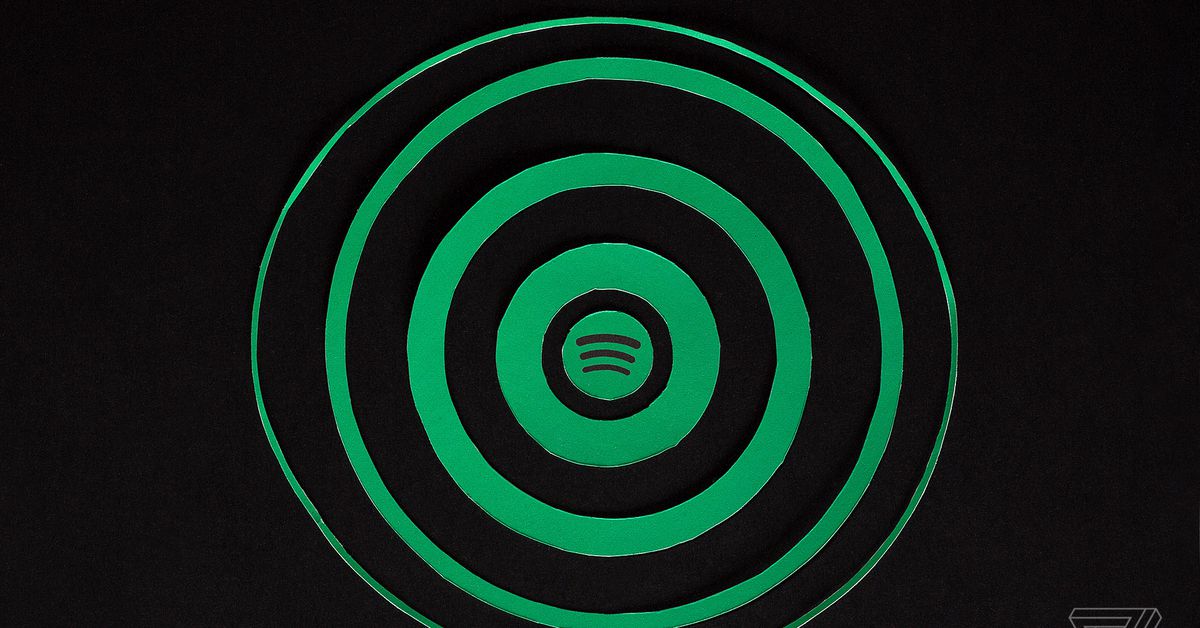
Spotify is disbanding its founding podcast studio and laying off some of the team. An affected employee tells The Verge that Studio 4, or Spotify Studios as it’s been referenced externally, consisted of 10 to 15 employees and produced shows like Dissect and Chapo: Kingpin on Trial. Spotify called affected employees on Friday and said their last days would be January 21st. They’ll receive two months’ worth of severance. Some employees were reassigned while others were laid off and pointed to the Spotify job board. The studio’s head, Gina Delvac, was also let go.
Spotify declined to comment. In a note to Spotify staff obtained by The Verge, however, Julie McNamara, head of US studios and video, acknowledged the layoffs and said shutting the studio down would enable the company to “move faster and make more significant progress and facilitate more effective collaboration across our organization.”
For a company sharing news of its podcasting endeavors most anywhere it can, Studio 4 rarely, if ever, showed up in the press. (I only documented one public use of it.) However, Studio 4 does occasionally appear in earnings reports as Spotify Studios. It was the first podcasting studio Spotify created and consisted of all the employees who worked on podcasting prior to the company’s major network acquisitions. Additional employees were later hired, but the initial group helped prove the podcasting business model and listener interest with shows like Amy Schumer Presents: 3 Girls 1 Keith, says a former employee who asked not to be identified due to ongoing work in the industry.
The team eventually rounded out Spotify’s in-house studio offerings, including its three acquired networks: Parcast, Gimlet, and The Ringer. The Studio 4 name is literal, as in it’s the fourth studio at Spotify. It’s also, as one Spotify employee put it to me, “insulting” to the people who work there, given that it has no brand identity or mission statement. They say it often operated more like a “junk drawer” for projects that didn’t find a home within the other three networks.
“When you have Studio 4, it’s like, ‘Well, if all of these boxes are already checked by all of these other studios, then where does that really leave us,’ and so it felt to me like there was no clear mandate of what Studio 4 was supposed to do,” the affected employee says.
Though the studio didn’t have its own clear initiatives, its content covered music and artists as well as celebrity deals and influencer-hosted content.
“A lot of the successes that Spotify Studios had were never really vocalized because the leadership was always churning,” the former employee says, pointing out that Liz Gately formerly ran the studio but was then shuffled into a new role. Delvac took over, and in September McNamara was hired to oversee the team under Courtney Holt, VP of global podcasting. (Above Holt sits Dawn Ostroff, chief content and advertising officer.)
“I have never once heard anybody mentioned Studio 4 by name or point to any of the work or the shows that we’ve done as something to be celebrated,” the affected employee says. “We’re being intentionally disregarded in explanations about metrics, and growth, and listenership, and all that kind of stuff.”
“When you go through a year of that … where you’re behind the scenes, and you’re creating things, and it just doesn’t get the love or the shine that the other studios get, I think that causes a lot of rightful thoughts to be going through your head of like, ‘Hey, what does the upper echelon of the executive community at Spotify think about the studio, what we’re doing, and how easily could they just sweep it under the rug,’ which they ended up ultimately doing,” the former employee adds.
The team most recently produced programming like Nosy Neighbors, We Said What We Said, and Dope Labs, as well as partner programs like Prince Harry and Meghan Markle’s 2020 holiday special. The former employee says that one show, Wind of Change, was produced under the studio, but was then handed to Gimlet to oversee the next release in the Pineapple Street Studios partnership — Welcome to Your Fantasy. They say successes were given away.
Since Studio 4’s inception, Spotify spent millions not only buying up new studios and networks, but also securing high-profile deals with big podcasting names like Joe Rogan, Alex Cooper of Call Her Daddy, and Dax Shepard of Armchair Expert. It’s also focused heavily on its ad technology with the acquisition of hosting company Megaphone, which was the centerpiece of most of the company’s announcements this past year. However, Spotify hasn’t shared numbers on how its acquired entities are doing.
Though Spotify says more podcasts than ever are on its platform, an August Business Insider report said Gimlet itself has struggled to grow inside the tech company due to “unclear strategy” and “internal tensions.” It had the lowest numbers of all four studios in terms of consumption hours in leaked metrics for September 2020. Meanwhile, a Verge report found that Spotify’s licensed exclusives, Joe Rogan’s show specifically, might have lost a significant chunk of its audience in the move to the platform.
For now, Spotify hasn’t said how partner programs will be produced moving forward and what will happen to shows currently in production. Original programming will obviously live on within the three networks Spotify bought, but Studio 4’s shutdown shows that Spotify wasn’t able to build a wholly independent production team from scratch.
When asked what the studio’s biggest show was, or what people should know about, the affected employee couldn’t name one.
